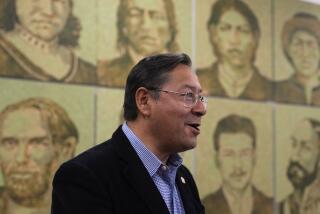Failed Coup’s Message to Marcos: ‘You’re Finished, Pal’
- Share via
The coup attempt itself was pure comic opera. Defeated vice-presidential candidate Arturo Tolentino’s attempt to oust the government of Corazon Aquino lasted just 38 hours. Most of the soldiers who gathered around him in the plush Manila Hotel deserted as soon as they realized that senior military officials stood by the new government. Tolentino, who left soon after, said that he could not remain in the hotel for long because it was too expensive.
There were several reasons for the ill-fated attempt to overthrow the Aquino government. Supporters of ex-President Ferdinand E. Marcos were not about to give up all hope of regaining power after enjoying it for a generation. Some of Aquino’s initial reforms had generated considerable opposition. The economy, after an initial pick-up, is in the doldrums. And the government’s tolerance of pro-Marcos demonstrations suggested a possible unwillingness to confront serious opposition.
Nevertheless, the fact that the attempt failed ignominiously can only help the new government. The coup revealed nothing so much as how little popularity Marcos commands in the country. Particularly significant was the absence from the Manila Hotel of old Marcos associates such as former minister Blas Ople who are committed to building a loyal opposition untainted by the past.
And the government surely gained support by acting with a calm and restraint that reflected a good deal of maturity and confidence.
Events also helped the United States. The official U.S. statement supporting the Aquino government should go a long way toward laying to rest the charges that the United States still desires the return of Marcos. Belief in American support for the Aquino government should receive an added boost from her official visit to this country in September.
Yet these unexpected dividends from the political farce just enacted in Manila should not obscure the serious challenges facing both the United States and the Philippines. The Reagan Administration still has the awkward problem of what to do about Marcos. There does not seem to be proof of a direct role by Marcos in the coup attempt, yet it is difficult to imagine that it could have happened without at least his tacit support. The Administration has warned him about behavior inconsistent with his status as a guest in the United States. But our leverage is limited. Everyone--including the Aquino government--agrees that it is better to have Marcos here than elsewhere, where he might be less constrained.
American concerns transcend Marcos, however. Washington has a clear stake in the future success of the Aquino experiment. At issue are not only valuable strategic assets in the Philippines but also the effect of a successful transition from authoritarianism to democracy. What happens here will have a ripple effect in other countries around the world where U.S. political, economic and military interests are in jeopardy because of political unrest.
For Aquino the stakes and challenges are if anything greater. Once again she owes a considerable debt to Defense Minister Juan Ponce Enrile. It was his backing that proved crucial in ousting Marcos; here it was his quick denunciation of the rebels that doomed the coup. Yet it is an open secret that the president and her defense minister often are at odds: She and those around her are wary of his independent power base and possible political ambitions. He reportedly is wary of leftist influence in her government. A falling out between them could threaten national stability.
Related to this is the fundamental problem of the insurgency. Aquino has yet to pursue the communist New People’s Army with the tenacity that the military prefers. The radical left is divided and weakened after the Aquino victory. But the offer of amnesty has yet to bring many guerrillas down from the hills, because means must be found to protect former guerrillas and to help them make a living. Meanwhile, the war goes on.
There are other political challenges. Much of Aquino’s future will depend on the success of the constitutional convention, currently scheduled to produce a draft document in September. Aquino, who forced from office a large number of Marcos loyalists around the country, also must follow through on her promise to hold local elections.
Finally, the government has yet to turn the economy around. There is some good news--the currency has stabilized, inflation and interest rates are down, exports are reviving. But the economy is hurt by reduced tourism, fallen commodity prices and a large foreign debt. Above all, the country is hobbled by a low level of foreign investment. Foreigners tend to take their cue from Filipinos, who have yet to demonstrate much confidence in their own future.
Arturo Tolentino may have done the government a service if his inept bid for power convinces his countrymen that the new order is here to stay.
More to Read
Sign up for Essential California
The most important California stories and recommendations in your inbox every morning.
You may occasionally receive promotional content from the Los Angeles Times.













